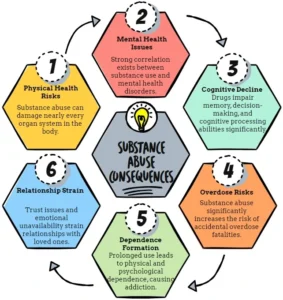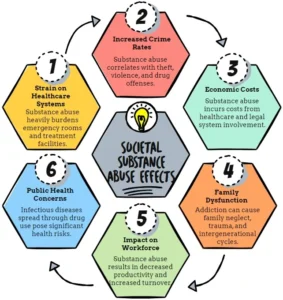Drug use, including alcohol, can have devastating effects, not only on the person abusing substances but also on their close and broader environments. The ripple effects are far-reaching.

Impact on physical health
Chronic (long-term) abuse of drugs or alcohol can lead to any number of physical health problems, deteriorating the metabolic function, tissue and immune system.
These are often aggravated by poor sleeping and eating habits, degrading hygiene, unreliable medication intake, and lack of exercise and hydration.
Risky behaviours presented concurrently with substance consumption –if not abuse- are associated with a higher risk of STDs and injury, notably including accidents caused when driving under the influence.
Prolonged or extreme intoxication also induces withdrawal symptoms when consumption stops which may be severe enough to cause comatose states or death.
Impact on mental health
The selfish behaviour that accompanies the mental obsession and physical compulsion to get, use and obtain more drugs or alcohol – addicts obsess with gratifying their need to use and direct their thoughts and actions to this end – progressively degrade the addict’s moral compass, causing spiritual distress, entrenching deep anger, shame and guilt and engendering neurosis.
Most people suffering from addiction also present mental health issues such as depression, anxiety disorders, ADHD, bipolar disorders and suicidal tendencies. Higher rates of borderline personality disorders, schizophrenia and a broad range of other disorders are also frequently presented.
While it is true that these conditions may be induced by substance abuse, they are most often underlying and aggravated by the abuse, which generally serves as self-medication.
Mental health issues are brought about or aggravated “chemically” by the substances – for example, cases of schizophrenia have been associated with the use of hallucinogenic drugs, research is yet to confirm a direct link – but also by associated behaviours. In particular, repeated use of mind-altering substances causes gradual dissociation from reality, and drug users are prone to sleep deprivation from both low quality and insufficient sleep.

Impact on the family
Living with somebody who abuses substances is difficult. An addict’s mood is erratic and can range from abusive to lethargic, via overly excitable and reckless with possible rapid changes between these states, whether or not under the influence. Addicts tend to feel victimised and blame others for their condition and the consequences of their using. Chaotic behaviour includes reckless use of money, often at the expense of household maintenance, and addicts often fail to carry their weight in running a home and add to the burden.
The resulting emotional upheaval and financial insecurity disrupts the home life, forcing other members into defensive and compensating behaviours, straining relationships sometimes to the point of leading to divorce. Children growing up in homes with addiction frequently either become addicted themselves or marry an alcoholic/addict or both. Many adults who have experienced such a childhood eventually seek therapy or join Adult Children of Alcoholics (ACOA). For that reason and because genetic factors are likely, it is said that addiction is a family disease, that the addict is the symptom of a dysfunction in the family and that the whole family should seek help.
Impact on the social environment
A rule of thumb is that every addicted person negatively affects 16 people around them.
Alcohol and drugs use affect performance substantially and lead to absenteism, either to recuperate from a binge or to indulge in using. Erratic behaviour also create a hostile environment. At work or school, poor performance, unreliability, and a temper eventually lead to disciplinary action and then job loss or expulsion. Socially speaking, addiction results in loss of productivity and decreases in tax intake.
Increased rates of addiction and diseases associated with substance abuse put a strain on the medical system. Addicted patients are rarely cooperative at first, underestimate their condition, often present a dual diagnosis with mental health issues, do not take their meds responsibly and more often than not require long-term or repeated care.
A substantial portion of crimes processed by the legal system have an addiction component, not just because drug trafficking and use are illegal but also because many criminal activities are performed under the influence – whether to provide artificial courage or because of the recklessness induced by intoxication. In many addicts, intoxication triggers or amplifies violent behaviour. Intoxication also makes the addict vulnerable and an easy target for all types of assault.
Treating one person helps on average 16 people. Get help now, for yourself or your loved one. Call us: 081 444 7000 (South Africa) 0800 955 4357 (UK)
Fighting addiction
By all accounts, fighting addiction is a titanic task, the intricacies being so vast and layered. However, the cost of leaving it go rampant is higher, as addiction only progresses, only amplifies, and only creates havoc on its path. Studies have shown that for every $1 spent on addiction treatment, approximately $7 is saved in damages avoided and productivity restored.
Independent research by the European Association for the Treatment of Addiction (EATA) has demonstrated that treatment can be effective – more likely so if the patient is matched with the appropriate type of treatment. Once in recovery, patients not only stop destructive behaviours, but they can reunite with their families, gain employment, and pay taxes. They are no longer a burden on the health and legal systems; they do not create an addiction-triggering environment anymore.
If you feel that the impact of substance abuse on your life is getting out of hand, please take heart. You can reclaim your life from this illness. We Do Recover provides expert advice in finding the treatment centre that will best serve your needs. Contact us today.
Call us for a confidential assessment and how addiction treatment is paid for a medical aids, call us: 081 444 7000 (South Africa) or 0800 955 4357 (UK)